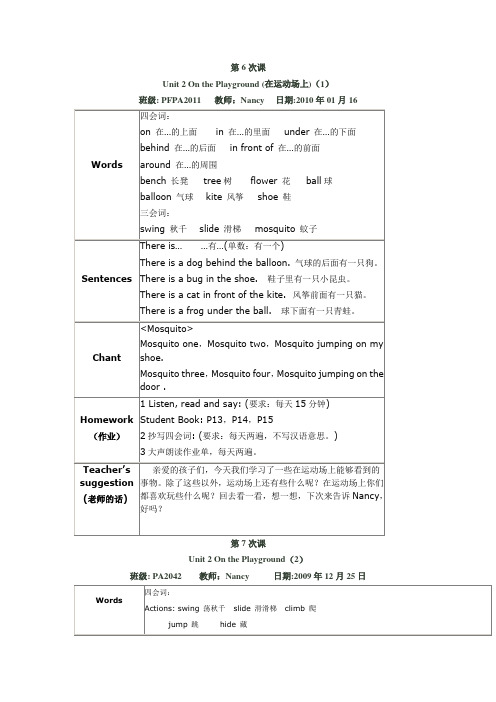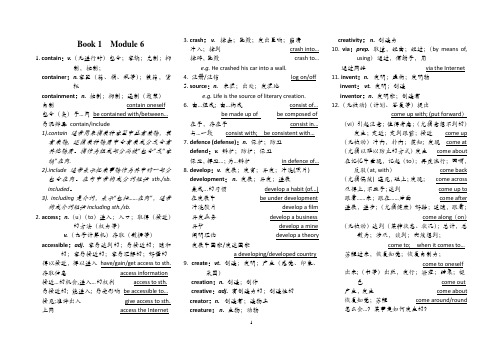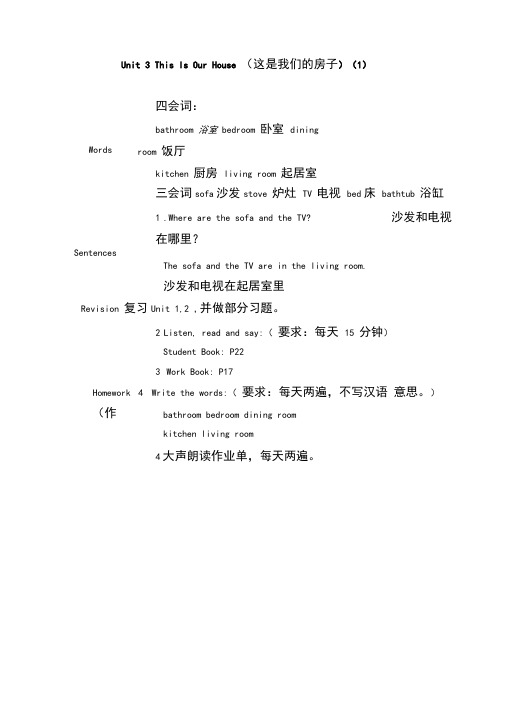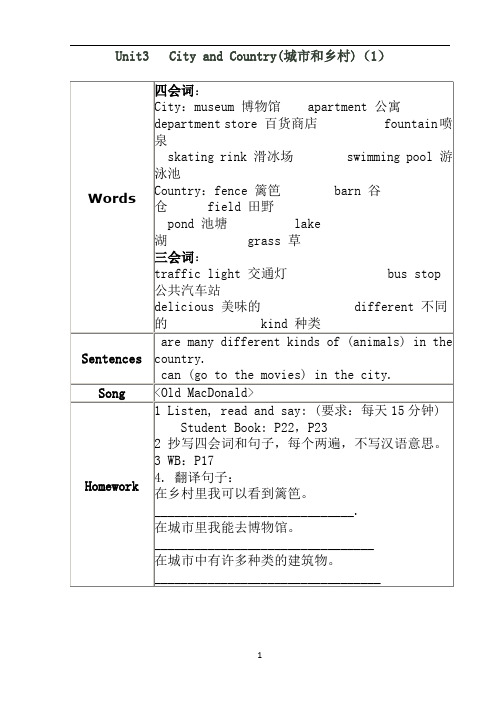新派英语book及book全部知识点梳理图文稿
新标准英语第十册知识框架图(完整版)

in English,last week,a children’s theatre,women’s clothes,men’s clothes,told lots of jokes,laughed a lot,English children,after the show,ate hamburgers and chips,get ready for,read a book,Chinese history,ask you questions,borrow a bike
M8
Decision
Unit 1 Will you help me?
Unit 2 How I made the kite.
Making decisions
I think I’ll make a Chinese kite!
Will you help me?
of course, drew, piece, paper, scissors
M3
Library
Unit 1 Have you got the Harry Potter videos?
Unit 2 You can use the computers.
Using a library
Have you got the Harry Potter video?
Sorry, we haven’t got the vid源自o.M6Travel
Unit 1 We’ll see lots of stones.
Unit 2 It was amazing.
Talking about an event
We’ll see lots of stones.
新派英语book5 Unit1 My Family’s Story加油站

Unit 1 My Family’s StoryGrammar(语言点):1 名词所有格:一般用于有生命的东西,表示…的①一般在名词后加’s:Mike’s car , my father’s name②以s结尾的名词后加’:Luis’ sister, the workers’ office③归几个人共同所有的,在最后一个名词后加’s: Mary and Tom’s room④各人都有的,在每个名词后加’s: Mike’s and Jane’s rooms⑤表示店铺,住家和公共建筑时,所有格后面的名词习惯上省略:to Smith’s2 感叹句:表示喜怒哀乐等强烈情感,用how或what来引导,句末用感叹号。
句型:How + 形容词/副词+ 主语+ 谓语例:How happy I am! (我是多么开心啊!)句型:What + a/an + 形容词+ 名词+主语+ 谓语例:What a fine day it is! (多么好的天气啊!)句型:How + 形容词或What + a/an + 名词例:How wonderful!(妙极了!)What an idea!(好主意!)3.形容词的比较级和最高级(1)当两者进行比较的时候用形容词的比较级A + be动词+ 形容词比较级+ than + B;例:My father is taller than my mother.(我爸爸比我妈妈高。
)(2)当三者和三者以上比较时用形容词的最高级 A + be动词+ 形容词最高级+ 范围例:My grandfather is the tallest one in my family.(我爷爷是我家最高的。
)(3) 形容词变比较级和最高级的规则A.一般在词尾直接加er或est,例如,tall-taller-the tallest,long-longer-the longestB.以不发音的字母e结尾的单词在词尾直接加r或st,例如,nice-nicer-the nicestC.以辅音字母+y结尾的词,把y变为i,再加er或est,例如,heavy-heavier-the heaviestD.重读闭音节,末尾只有一个辅音字母,双写这个辅音字母,再加er或est,例如,big-bigger-the biggest, fat-fatter-the fattestE.部分双音节词和多音节词分别在原级前加more构成比较级和most构成最高级,例如,slowly-more slowly-the most slowly;beautiful-more beautiful-the most beautifulG. 不要忘记最高级前面要加“the”F. 不规则变化good /well- better- the best bad/ ill/ badly - worse – the worstmany/ much- more – the most little – less- the leastfar – farther/ further– the farthest/ the furthestold – older /elder – the oldest/ the eldest。
朗文新派少儿英语2A基础级第2单元知识点

Work Book:P12
Model: There are nine children on the playground.
A girl is dancing in front of a tree.
Two boys are running behind a slide.
……
Homework
第7次课
Unit 2 On the Playground(2)
班级: PA2042教师:Nancy日期:2009年12月25日
Words
四会词:
Actions: swing荡秋千slide滑滑梯climb爬
jump跳hide藏
Numbers: ten (10)twenty (20)thirty (30)
Homework
(作业)
1 Listen, read and say: (要求:每天15分钟)
Student Book: Unit 2
2抄写小故事一遍;
3大声朗读作业单,每天两遍。
Teacher’s suggestion
(老师的话)
亲爱的孩子们,我们在今天的小故事中看到了几个国家的小朋友呀?他们都在运动场上做什么呢?你能说一说,我们国家的小朋友都在运动场上做什么吗?
Unit 2 on the Playground(5)
班级: PFPA2011教师:Nancy日期:2010年01月30日
Words
四会词:
children孩子们play玩
三会词:
Ireland爱尔兰Trinidad特立尼达岛
the United States美国game游戏
baseball and bat棒球和球棒jungle gym攀岩架
book1-module6知识点

Book 1 Module 61.contain:v.(无进行时)包含;容纳;克制;抑制,控制;container:n.容器(箱、桶、瓶等);装箱,货柜containment:n.控制;抑制;遏制(政策)自制contain oneself 包含(夹)于…间be contained with/between…易混辨异contain/include1).contain通常用来指某种容器中盛有某物,装有某物, 还指某种物质中含有某成分或含有其他物质。
指作为组成部分而被“包含”或“容纳”在内.2).include通常表示把某事物作为其中的一部分包含在内。
在句中常构成分词短语sth./sb.included。
3). including是介词,表示“包括……在内”,通常构成介词短语including sth./sb.2. access:n.(u)(to)进入;入口;取得(接近)的方法(权力等)v.(电子计算机)存取(数据等)accessible:adj.容易达到的;易接近的;随和的;容易接近的;容易理解的;好懂的得以接近,得以进入have/gain/get access to sth. 存取信息access information 接近…的机会,进入…的权利access to sth. 易接近的; 能进入; 易受影响be accessible to…接见;准许出入give access to sth. 上网access the Internet 3. crash: v.撞击;坠毁;发出巨响;崩溃冲入;撞到crash into…撞碎,坠毁crash to…e.g. He crashed his car into a wall.4. 注册/注销log on/off5. source:n.来源;出处;发源地e.g. Life is the source of literary creation.6. 由…组成; 由…构成consist of…be made up of be composed of在于,存在于consist in…与…一致consist with; be consistent with…7. defence (defense):n. 保护;防卫defend:v.辩护;防护;保卫保卫,捍卫…;为…辩护in defence of…8. develop:v.发展;发育;开发;冲洗(照片)development:n.发展;开发;进展养成...的习惯develop a habit (of...)在发展中be under development冲洗胶片develop a film开发业务develop a business开矿develop a mine阐明理论develop a theory发展中国家/发达国家a developing/developed country9. create:vt.创造;发明;产生(感觉、印象、氛围)creation:n.创造;创作creative:adj.有创造力的;创造性的creator:n.创造者;造物主creature:n.生物;动物creativity: n.创造力10. via:prep.取道,经由;经过;(by means of,using)通过,借助于,用通过网络via the Internet11. invent:n.发明;虚构;发明物invent:vt.发明;创造inventor:n.发明家;创造者12.(无被动)(计划、答复等)提出come up with; (put forward)(vi)引起注意;值得考虑;(尤指意想不到的)发生;走近;走到跟前;接近come up(无被动)冲向,扑向;获知; 发现come at(尤指以难以防止的方式)发生come about在记忆中重现,记起(to);再度流行;回嘴,反驳(at, with)come back(尤指偶然) 遇见,碰上;发现;come across及得上,不亚于;达到come up to跟着……来;跟在……后面come after进展,进步;(尤指健康)好转;追随,跟着;come along(on)(无被动)达到(某种状态、状况);总计,总数为;涉及,谈到;突然想到;come to; when it comes to…苏醒过来,恢复知觉;恢复自制力;come to oneself出来;(书等)出版,发行;泄露;结果;褪色come out产生,发生come about恢复知觉;苏醒come around/round怎么会…?某事是如何发生的?How did it come about that…?加油,加把劲;(表示知道某人所说的不正确)得了吧,算了吧come on 出现;产生,诞生come into being怎么回事?怎么发生的?怎么解释?How come…? 13. design:v.绘制…的图样,设计;构思;(常用被动)计划;筹划;设置n.图样,图案;设计图;草图;图纸;装饰图案;意图,目的,打算designer:n. 设计者;谋划着故意地,蓄意地,有计划(目的)地by design=on purpose 为..设计/计划be designed for sb./sth.专为……而做(设置) be designed for/to do sth.设计…为… design …as…图谋(钱或生命) have designs on/upon sth.※此知识点部分出现在Book 5 Module 5中;14. permit:v.(口头或书面上)认可,允许;准许;容许,许可;n.许可证permission:n. (u) 许可;准许;批准未经允许without permission/a permit/being permitted 在某人的许可下with sb.’s permission准许干某事permit doing/allow doing sth.允许某人干某事permit/allow sb. to do sth.如果天气/时间允许的话Weather/Time permitting,…允许做某事permission for sth/ to do sth申请、签发许可证apply for/issue a permit许可,准许(无被动)permit of sth.请求允许ask for permission禁止某人做某事forbid sb. to do sth.禁止做某事forbid doing sth.15. concentrate:v.(on/upon)集中(思想、精力、注意力等);(使)集中于…;(使)汇集于…n. 浓缩液concentration:n.(u)专心, 专注;集中;汇集concentrated:adj.浓缩的;专心致志的;全力以赴的集中…在… be concentrated in/on/upon sth.专注于…… concentrate (sth.) on/upon+n.把注意力/努力/思想集中到…concentrate one’s attention/efforts/thoughts on sth.聚精会神地with concentration***和concentrate on意思相同的短语:fix one’s attention/mind on/upon...; focus onbe absorbed in…;bury oneself in sth.devote...to.../be devoted to…16. independent:adj.独立的;自主的;无偏见的independence:n. 独立;自主dependent:adj. 依靠的,依赖的;从属的独立的,与......无关的be independent of依赖;依靠depend on; be dependent on17. pass:vt.超过;通过;度过;传递去世pass away 把...一代传一代pass down18. frequently:adv.经常地,频繁地frequent:adj.频繁的;经常的frequency:n. 频繁;频率with increasing frequency19. advantage:n.(c)(over)有利条件;优势;利益,好(长)处;优点;disadvantage:n. 不利条件;劣势胜过;优于 have an advantage over…利用take advantage of…=make full use of …(对某人)有利地to one’s advantage处于不利地位be at a disadvantage有…优点have the advanta ge of …攻其不备take sb. at a disadvantage使某人处于不利地位put sb. at a disadvantage20. average:n.平均数;平均水平;一般标准adj.平均数的;平常的,普通的;(usual,ordinary)v.平均(是);(无被动)平均做(得到);在平均水准以上/下above/below (the)average按平均数计算on (the/an) average达到平均量,(最后达到平衡)average out at/to达到平均的(地) up to (the) average平均为… with an average of……达到平均数average to/at…21. statistics:n.注意:statistics作为“统计学”时不可数。
朗文新派少儿英语基础级第3单元知识点

Unit 3 This Is Our House (这是我们的房子)(1)四会词:bathroom 浴室 bedroom 卧室 diningroom 饭厅kitchen 厨房 living room 起居室三会词sofa 沙发stove 炉灶 TV 电视 bed 床 bathtub 浴缸1 .Where are the sofa and the TV?沙发和电视在哪里?SentencesThe sofa and the TV are in the living room.沙发和电视在起居室里Revision 复习Unit 1,2 ,并做部分习题。
2 Listen, read and say:( 要求:每天 15 分钟) Student Book: P223 Work Book: P174 Write the words:( 要求:每天两遍,不写汉语 意思。
)bathroom bedroom dining room kitchen living room4大声朗读作业单,每天两遍。
WordsHomework (作业)Unit 3 This Is Our House (2)Words 四会词:lamp 台灯sofa沙发三会词:bookcasetable 桌子书架TV 电视chair 椅子stove 炉具SentencesHomework(作业) plant 植物户curtains子kniferug窗帘地毯windowspoon 勺子窗fork 叉刀plate 盘子sink 洗涤槽refrigerator 冰箱Where is the lamp?There is a lamp in the living room.否定句在is后面加上“not'表示否定There is not a lamp in the kitchen.1 Listen, read and say:(Student Book: P222 Write the words:(要求:每天15分钟),P23要求:每天两遍,不写汉语意思lamptablebookcase TV sofachair stove3根据例句将四会词分别造句Unit 3 This is our house(这是我们的房子)(3)Living room:clock (钟)sofa (沙发)bookcase (书架) rug (地毯)TV (电视)lamp (台灯) Dining room:table (桌子)chair (椅子)window (窗户)curtain (窗帘)Kitchen:refrigerator ( 冰箱)stove (炉具) Bathroom:sink (洗涤槽)tub (浴缸)toilet (马桶) Bedroom:bed (床)blanket (毛毯)dresser (梳妆台)phone (电话)Page 1:Father,Mother, and Baby Bear are in the kitchen.(熊爸爸,熊妈妈和熊宝宝在厨房里.)Mother Bear puts milk on the table.(熊妈妈把奶放在桌子上.)“ It ' s too hot, " says Baby bear!(宝说:"牛奶太热 了!。
新派5册4~5单元复习要点

New Parade Book 5新派英语第五册Unit 4 Shopping一、需要掌握的单词:四会(听说读写)词汇:1.ad广告,2.air空气,3.aisle走廊,4.button扣子,5.CD唱片,6.clothes衣服,7.collar领子,8.disk唱片,9.end终点, 10.guitar吉他, 11.jacket夹克衫, 12.jewelry珠宝, bel标签, mp台灯, 15.luggage行李, 16. mall购物中心, , 17.pocket口袋, 18.poster海报, 19.price价格, 20. puppy小狗, 21.rack架子, 22.ring戒指, 23.sale廉价销售, 24.shirt衬衫, 25.shoe鞋子, 26.size尺码, 27.sleeve袖子, 28.sneaker运动鞋, 29.stamp邮票, 30.T-shirtT洫衫, 31.zipper拉链, 32.avenue大街, 33.block街区, 34.bus station汽车站, 35.corner角落, 36.direction方向, 37.hospital医院, 38.store商店, 39.continue继续, pare 比较, 41.cost花费, 42.fit适, 43.imagine想象, 44.jump跳, 45.leap跳过, 46.wear穿戴, 47.baggy松弛的, 48.cheap便宜的, 49.colorful艳丽的, fortable舒服的, 51.expensive贵的, 52.fancy华丽的, 53.medium中号的, 54.pretty漂亮的, 55.small小的, 56. smaller更小的, 57.warmer更暖和的, 58.faster更快的, 59.higher更高的其它词汇: 1.checked方格子花纹的, 2. flowered有花的, 3.plaid有方格花纹的, 4.solid-colored单色的, 5.striped有斑纹的二、需要掌握的词组:1.a pair of一双,2. turn left向左转,3.turn right向右转,4.try on式穿,三、需要掌握的句子:1. 形容词的比较级(more+长音节单词的情况)如:more expensive more colorful2. 指路的常用表达start at…/ go straight ahead/ go past…/ turn…next to/ across from/ on the …/ on the corner of…等等口语:指路P32,35 写作:广告P36New Parade Book 5新派英语第五册Unit 5 What a Trip!一、需要掌握的单词:四会(听说读写)词汇:1.accident意外,事故,2.ankle脚脖子,3.bee蜜蜂,4.diary日记,5.dining room饭厅,6.experience经验,7.honey蜂蜜,8.hotel旅馆,9.inch英寸, ke湖, 11.lifeguard救生员, 12. noise噪音,13.pier码头, 14.pool池塘, 15.road路, 16.rock岩石,17.side边, 18.symbol符号, 19.waiter服务生, 20.whistle哨子, 21.window窗户, 22.bear熊, 23.camper露营者, 24.campsite露营地, 25.flashlight手电筒, 26.flat tire扁的轮胎, 27.picnic野餐, 28.sleeping bag 睡袋, 29.tent帐篷, 30.cloud云, 31.flood洪水, 32.lightening闪电, 33.season 季节, 34.storm风暴, 35.thunder雷, 36.thunderstorm雷雨, 37.weather 天气, 38.calendar日历, 39.month月份, 40.blow吹, 41.cause引起, 42.cook做饭, 43.drive驾驶, 44.find找到, 45.fish钓鱼, 46.float 漂浮, 47.happen发生, 48,hurry赶紧, 49. pick采摘, 50.pour下倾盆大雨, 51.ride骑, 52.roar轰鸣, 53.strike照射, 54.cloudy多云的, 55 rainy下雨的, 56.snowy下雪的, 57.sunny晴朗的, 58.windy有风的, te-night深夜, 60.loud大声的, 61.scary吓人的, 62.worse更差的, 63.worst最差的, 64.inside在里面, 65.outdoors户外, 66.still仍旧其它词汇:1.air mattress气垫, 2.fishing pole鱼竿, 3. Frisbee飞盘,二、需要掌握的词组:1.take pictures照相,2.put out挂起,支起,三、需要掌握的句子:1.过去时(新出现的特殊过去时wake-woke, blow-blew,strike-struck,hit-hit)2.过去进行时was/were doing,表示过去某时正在发生的事情。
新起点英语知识点清单

新起点英语知识点清单
新起点英语知识点清单包括以下内容:
1.词汇:包括各种常用词汇和短语,例如“get up”、“go to school”、“go to bed”等。
2.语法:包括各种语法知识点,例如动词时态、名词复数形式、形容词比较级等。
3.阅读理解:介绍如何提高阅读理解能力,包括快速阅读技巧、阅读策略等。
4.写作:介绍如何提高写作能力,包括写作技巧、写作策略等。
5.听力:介绍如何提高听力能力,包括听力技巧、听力策略等。
6.口语:介绍如何提高口语能力,包括口语技巧、口语策略等。
以上是新起点英语知识点清单的主要内容,通过学习和掌握这些知识点,可以帮助学生更好地掌握英语语言技能,提高英语水平。
朗文新派少儿英语巩固级第3单元知识点

<Old MacDonald>
Homework
1 Listen, read and say: (要求:每天15分钟)
Student Book: P22,P23
.翻译句子:
在乡村里我可以看到篱笆。______________________________.
在城市里我能去博物馆。_________________________________
在城市中有许多种类的建筑物。__________________________________
Unit3 City and Country(城市和乡村)(2)
Phrases
paint a fence刷篱笆clean the bedroom收拾卧室go to the supermarket去超市cut the grass剪草make the bed整理床铺wash the dishes洗盘子water the plants浇花feed the (bird)喂(鸟)
Homework
1 Listen, read and say: (要求:每天15分钟)
Student Book: P27,P28
Sentences
have to / has to必须,不得不
do you have to do every day
I have to get up at 6:00 every day.
does he have to do every day
He has to feed his bird, cat, and fish every day.
does City Mouse want to go
do the two cousins see in the city
朗文新派少儿英语基础级第4单元知识点

Words
四会词:
community社区between在…和…之间
三会词:
thermometer温度计letter信
town城镇city都市,城市
Sentences
Where is the (video shop)音像店在哪里
The (video shop) is between the (supermarket) and the (bank).音像店在(超市)和(银行)之间。
are walking on the street.我们正在街上走. We see a fire truck in the fire station!
我们看到一辆消防车在消防局里.
“Hello, firefighter!” we say.
“你好,消防员!”我们说.
is the end of our trip.我们的旅行要结束了. We get ice cream cones and eat at the park.我们买了冰淇淋在公园里吃.
street(街道) video shop(音像店)
(每个5遍)并背诵
Unit 4 My Community(2)
深入词汇
单词归类
video shop(音像店)post office(邮局)
street(街道)supermarket(超市)
bank(银行)police station警察局
restaurant(饭店) hospital(医院)
Unit 4 My Community(1)
了解词汇
bank(银行) movie theater(电影院) fire station(消防局)police station(警察局)hospital(医院) restaurant(饭店)
新概念英语第一册L1-16课知识点整理

NCE L1—L16Words1. pen pencil book watch coat dress shirt skirtsuit T-shirt blouse tie2. China-Chinese France-French Germany-German Japan-Japanese Korea-Korean Sweden-Swedish America-American Italy-Italian English-England nationality3. keyboard operator engineer policeman policewoman taxi driverpostman nurse mechanic hairdresser housewife milkman housewife air hostess4. short-long short-tall dirty-clean fat-thin hot-cold old-newold-young busy-lazy5. green red pink blue yellow brown purplesilverPatterns日常用语1.-Excuse me! -Yes?2.-Nice to meet you. -Nice to meet you, too.3.-How do you do?-How do you do?4. -How are you today? –I’m fine, thanks./I’m very well, thank you.核心句型1. This is my handbag.This isn’t my handbag.Is this your handbag?Yes, it is. / No, it isn’t.2. These are my books.Are these your books?Yes, they are. / No, they aren’t.3. What’s your job? I’m a nurse.4. What nationality are you? I’m Chinese.5. What make is it? It’s a Ford.6. What colour is your umbrella? It’s black.What colour are your umbrellas? They’re black.7. Whose handbag is this? / Whose is this handbag? It’s Stella’s.8. Are you a teacher? Yes, I am. Are you a policeman? No, I am not.知识点1.清辅音和浊辅音清辅音共12 个:[p] [t] [k] [f] [s] [θ ] [ʃ] [ts] [tr] [tʃ] [h] [r]浊辅音共16 个:[b] [d] [g] [v] [z] [ð] [ʒ] [dz] [dr] [dʒ] [l] [m] [n] [ŋ][ j ] [w]2.名词单复数形式可数名词单数在它之前可以加上冠词a/an(以元音字母a,e,i,o,u开头的字母前冠词用an)。
2023年高考英语必背知识手册(思维导图+背诵手册):动词的时态及语态(解析版)

专题01动词的时态及语态时态知识梳理重点用法1一般现在时用法:1.be(am,is,are)动词的使用由主语的人称和数决定。
行为动词的第三人称单数加-s/es,其余人称用动词原形。
I am free tonight.我今晚有空。
The boy is ten years old.这个男孩10岁了。
They are students.他们是学生。
Bill often helps others.We like him a lot.比尔总是帮助他人。
我们很喜欢他。
2.表示经常、习惯性发生的动作或存在的状态。
It often rains in our city.我们的城市经常下雨。
3.表示普遍真理和客观真实。
The earth moves round the sun.地球围绕太阳转。
4.表示心理状态或情感的动词往往用一般现在时。
She hates rock music.她讨厌摇滚乐。
5.在时间、条件状语从句中表示将来的动作。
I will call on you as soon as I am free.我空闲时会去拜访你。
提示:一般现在时可以用来代替一般将来时,表示已经预先计划或安排的肯定将要发生的动作,句中常有表示将来时间的状语。
这一用法主要用于下列动词,如果arrive(到达),be(是),begin(开始),come(来到),go(去),leave(离开),reach(到达),start(出发)等。
The train leaves at eight o’clock.火车8点钟开车。
注意:一般现在时常用的时间状语有:today今天often经常always一直sometimes有时usually通常seldom很少on Sunday在星期天every day/week/morning每天/每周/每天早上重点用法2一般过去时用法:1.be(was/were)动词的使用由主语的人称和数决定。
行为动词都要用过去式。
朗文新派少儿英语基础级第7单元知识点

cake potato drink soup juice milk water
3 WB:P54-4, P59
4大声朗读作业单,每天两遍。
Unit 7 Food (食物)(3)
Homework
(作业)
1 Listen, read and say: (要求:每天15分钟)
Student Book: P62
2 Write the words: (要求:每天两遍,不写汉语意思。) food banana sandwich orange tomato hotdog cookie apple hamburger lettuce bread carrot
Song
<I like bananas…> (SB:P62-1)
Grammar
可数名词与不可数名词
可数名词——能以数目来计算,可以分成个体的人或东西。如:一个苹果,两个苹果。可数名词有单数、复数之分,如:a table, two tables。
不可数名词——不能以数目来计算,或者本来是很大的一块,取时只能取其中的一部分。如:水(不能说成一个水,两个水)。因此,它没有单、复数之分,不能用a/an来修饰。需要表示个体意义时,要用一个特定的量词,如:a glass of milk (一杯牛奶)。
朗文新派少儿英语基础级第7单元知识点
Unit 7 Food (食物)(1)
Words
四会词:
food食物banana香蕉sandwich三名治
orange橘子tomato西红柿hot dog热狗
cookie饼干apple苹果hamburger汉堡
bread面包carrot胡萝卜
小学级英语基础知识汇总图文稿

小学级英语基础知识汇总集团文件发布号:(9816-UATWW-MWUB-WUNN-INNUL-DQQTY-小学1-6年级英语基础知识汇总{ 第一部分}基础知识1.字母:26个字母的大小写ABCDEFGHIJKLMNOPQRSTUVWXYZabcdefghijklmnopqrstuvwxyz2.音标:48个音标3.词汇:词汇量,近反义词4.句子:大小写,标点符号{ 第二部分 }语法知识一.名词:名词单复数,名词的格(一)名词单复数1.一般情况,直接加-s,如:book-books, bag-bags, cat-cats, bed-beds2.以s. x. sh. ch结尾,加-es,如:bus-buses, box-boxes, brush-brushes, watch-watches3.以“辅音字母+y”结尾,变y为i, 再加-es,如:family-families, strawberry-strawberries4.以“f或fe”结尾,变f或fe为v, 再加-es,如:knife-knives5.不规则名词复数:man-men, woman-women, policeman-policemen, policewoman-policewomen, mouse-micechild-children, foot-feet, tooth-teeth, fish-fish, people-people, Chinese-Chinese, Japanese-Japanese 不可数名词的复数就是原型: paper, juice, water, milk, rice, tea(二)名词的格(1) 有生命的东西的名词所有格:a) 单数后加’s 如: Lucy’s ruler my father’sshirtb) 以s 结尾的复数名词后加’如: his friends’ bagsc) 不以s 结尾的复数后加’s children’s shoesl并列名词中,如果把’s加在最后一个名词后,表示共有, 如:Tom and Mike’s car 汤姆和迈克共有的小汽车l要表示所有物不是共有的,应分别在并列名词后加’sTom’s and Mike’s cars 汤姆和麦克各自的小汽车(2)表示无生命东西的名词通常用“ of +名词”来表示所有关系:如:a picture of the classroom a map of China二.冠词:不定冠词,定冠词种类:(1)不定冠词:a / an元音开头的可数名词前用an :an egg / an apple / an orange / an eraser / an answer / an ID card / an alarm clock / an actor / an actress / an e-mail / an address / an event / an example / an opera / an houran old man / aninteresting book / an exciting sport / an action movie / an art lesson /(2)定冠词:the定冠词的用法:(1)特指某(些)人或某(些)物: The ruler is on the desk.(2)复述上文提到的人或物:He has a sweater. The sweater is new.(3)谈话双方都知道的人或物:The boys aren’t at school.(4)在序数词前: John’s birthday is February the second.(5)用于固定词组中: in the morning / afternoon / evening不用冠词的情况:(1)专有名词前:China is a big country.(2)名词前有定语:this , that , my , your , some, any , no 等:This is my baseball.(3)复数名词表示一类人和事:Monkeys can’t swim. They are teachers.(4)在节日,日期,月份,季节前:Today is Christmas Day. It’s Sunday.(5)一日三餐前:We have breakfast at 6:30.(6)球类棋类运动前:They often play football after class. He plays chess at home.* 但乐器前要用定冠词:I play the guitar very well.(7)学科名称前:My favorite subject is music.(8)在称呼或头衔的名词前:This is Mr Li.(9)固定词组中:at noon at night by bus三、代词、形容词、副词代词:人称代词,物主代词人称代词物主代词主格宾格第一人称单数I(我)memy(我的)复数we(我们)usour(我们的)第二人称单数you(你)youyour(你的)复数you(你们)youyour(你们的)第三人称单数he(他)himhis(他的)she(她)herher(她的)it(它)itits(它的)复数they(他们/她们/它们)themtheir(他们的/她们的/它们的)形容词,副词:比较级,最高级(一)、形容词的比较级1、形容词比较级在句子中的运用:两个事物或人的比较用比较级,比较级后面一般带有单词than。
纵览《新概念英语》只需一张图:第一册上半册

纵览《新概念英语》只需一张图:第一册上半册【前言】【不得不说的按语】从1967年诞生之日算起,按照孔子的说法,《新概念英语》如今已经过了“知天命”的年龄了。
如此高龄的英语教材,按理大家都应该对它烂熟于心了,然而事实却并不一定如此。
一套教材,在我们准备要教好它之前,不应该是马上就讨论各种教学方法或教具的使用,而应该首先吃透这套教材,也就是说先得确保自己对于该教材的所有内容都是烂熟于心的。
而在一套教材的所有内容中,其知识点的选择和排布是最为核心的,也是任课老师最需要去吃透熟悉的。
当然,对于学习者来说,这也正是他们最需要学习和掌握的。
而这,也正是小编觉得有必要跟大家分享的主要原因。
【教材故事】要说起时下谁对这套教材的内容最熟悉的话,恐怕非Julia Alexander莫属了。
谁是Julia Alexander?就是以下这位:她又是谁?她就是《新概念英语》经典版和青少版的作者Louis G. Alexander的第二任妻子。
但即使是她,也是在1979年Louis G. Alexander的第一任妻子Athina去世后,才在1980年嫁给他的。
而在此之前,Louis G. Alexander早就先后在1967年出版了《新概念英语》,在1972-74年出版了《Target》(《新概念英语青少版》的前身)。
从1980年结婚开始,到2002年Louis G. Alexander因肺炎不幸去世,Julia Alexander就一直追随Louis G. Alexander不遗余力地在世界各地推广英语教学、从事英语教学研究和教材编著。
即便是如此,Julia Alexander仍然在很多公开场合表明,她仍然在不断地学习和研究《新概念英语》的精髓。
这令我们这些所谓的英语老师情何以堪呐!Anyway!且不管Julia Alexander说的是客套话还是真心话,我们的英语学习还是得继续,我们对《新概念英语》的教与学还得接着干。
- 1、下载文档前请自行甄别文档内容的完整性,平台不提供额外的编辑、内容补充、找答案等附加服务。
- 2、"仅部分预览"的文档,不可在线预览部分如存在完整性等问题,可反馈申请退款(可完整预览的文档不适用该条件!)。
- 3、如文档侵犯您的权益,请联系客服反馈,我们会尽快为您处理(人工客服工作时间:9:00-18:30)。
新派英语b o o k及b o o k 全部知识点梳理集团文件发布号:(9816-UATWW-MWUB-WUNN-INNUL-DQQTY-【词汇】1. parent父或母2. clean 擦,洗3.cook烧,煮4. sweep the floor 扫地5. busy 忙,忙碌6. wash the dishes洗碗7. make the bed 整理床铺 8. grow 种植9. garden 花园,果园10.sweet甜的11. pest害虫 dybird瓢虫13. go away走了,离开 14.grow 生长15.wind 风 16.blow 吹;打击17.bring 带来 18.kettle壶【词组短语】1. help our parents 帮助我们的父母2. Saturday morning星期六上午3. clean the car洗车4. help him帮助他5. cook breakfast做早饭6. in the kitchen 在厨房7. in the living room在客厅8. sweep the floor 扫地 9. inhis bedroom在他的卧室里10. in the afternoon 在下午 11. my cousin我的表弟、表妹12.be busy忙碌的 13. cook dinner 做晚饭14. help her 帮助她 15.wash the dishes洗碗16. clean the table擦桌子 17. eat fruit吃水果18. watch TV看电视 19. make the bed整理床铺20.wash clothes洗衣服 21.in the morning 在早上22.listen to 听…… 23.grow grapes种葡萄24. in his garden在他的花园里 25.big and sweet 又大又甜26.on the grapes在葡萄上 27. so sweet 那么甜28. go away走了,离开 29.watch the flowersgrowing看花朵生长30.listen to the wind blowing 听风吹过的声音 31.put the kettle on 烧壶水32.they’ve all gone away 他们都离开了【句型】1.It is Saturday morning这是星期六早上。
2.My father is cleaning the car.我的爸爸正在洗车。
3.I am helping him.我正在帮助他。
4.My mother is cooking breakfast in the kitchen.我的妈妈正在厨房里做早饭。
5.What are we doing now我们现在正在做什么?6.Helen and I are helping her.海伦和我正在帮助她。
7.What are Tim and Jim doingThey are eating fruit in the living room.蒂姆和吉姆正在做什么?他们在起居室里吃水果。
8.We’re eating your grapes.我们正在吃你的葡萄。
9.The pests go away,but the ladybirds do not.害虫离开了,但是瓢虫没有。
【语法】本单元归纳呈现了现在进行时的特殊疑问句和肯定句,同时归纳了本单元出现的动词现在分词形式。
1. 现在进行时表示现在正在进行或发生的动作。
通常与表示现在的时间的单词连用及句首为look,listen等动词连用2. 现在进行时的构成:be动词(am,is,are)+动词-ing形式。
现在进行时的肯定句式结构:主语+be动词(am,is,are)+动词-ing形式+其他。
现在进行时的特殊疑问句式结构:特殊疑问词+be动词(am,is,are)+主语+动词-ing形式+其他?3. 动词现在分词的构成:(1)大部分动词是在其原形后直接加-ingdo-doing,clean-cleaning,cook-cooking,eat-eating,help-helping,wash-washing,watch-watching。
(2)以不发音e结尾的动词,先去掉e,再加-ing。
make-making,write-writing,take-taking,skate-skating,have-having,ride-riding(3)以重读闭音节结尾的动词,如果末尾只有一个辅音字母,则应先双写这个字母,再加-ing。
sit-sitting,swim-swimming,put-putting,run-running【语言知识点】1.My father is cleaning the car.我爸爸正在洗车。
这句话中的cleaning是动词clean的现在进行时,表示“正在洗刷”。
现在进行时的基本结构是“动词be动词(am,is,are)+现在分词(doing)”,动词be必须与主语的人称和单复数形式一致。
如:I am sweeping the floor.我正在扫地。
They are sweeping the floor.他们正在扫地。
She is sweeping the floor.她在扫地。
2.What is he doing now他现在正在做什么?此问句是现在进行时的特殊疑问句形式。
what是疑问代词,意思是“什么”。
当主语是第三人称单数时,be动词用is;当主语是第一人称单数时,be动词用am;其他人称时,be动词用are。
“be”动词+动词-ing 形式构成了现在进行时,表示正在做的动作。
例如:(1)What are you doing ,Tom你正在做什么,汤姆?(2)I’m looking for my toy car.我正在寻找我的玩具小汽车。
3.Bobby grows grapes in his garden.博比在他的花园里种了葡萄。
grow在这里作及物动词,是“种植”的意思。
如:They grow rice on the farm.他们在农场上种植水稻。
grow 也可以用作不及物动词,表示“生长”、“成长”、“变成”等意思。
如:The grapes are growing well.葡萄长得很好。
4.Then,some ladybirds come.后来,来了几只瓢虫。
Ladybird是指瓢虫。
瓢虫是一种体色鲜艳的小型昆虫,两鞘翅上有红、黑或黄色的斑点。
瓢虫的种类很多,不同种类的瓢虫习性也各不相同。
本单元和下一个单元的卡通故事就是基于不同种类的瓢虫的习性而展开的。
5.The pests go away,but the ladybirds do not.害虫走了,但瓢虫没有走。
这个转折并列句的后半句是一个省略句,在do not后省略了go away,目的是为了避免重复。
又如:Sam is happy ,but Bobby is not.萨姆是开心的,但博比不是。
(省略了happy)I would like to come but I can’t.我想来,但不能来。
(省略了come)go away 在这里是“走开”、“离开”的意思。
如:Wait here.Don’t go away.等在这里,别走开。
Rain ,rain,go away,little Johnny wants to play.雨呀,雨呀,快走开,小乔尼呀,想要玩儿。
6.I am helping him.句子中help是个动词,动词和介词后面用人称宾格him。
主格Iweyouhesheitthey宾格meusyouhimheritthem形容词性物主代词myouryourhisheritstheir7.一般现在时中be动词的用法一般现在时be动词有三种,am,is,are,其中 I 用am,名词单数或者不可数名词用is,复数we/you/they 用are 缩略式为:I’m,you’re,he’s,we’re,they’re否定缩略式 I'm not, isn't, aren't【语音】ing /I//I/是短元音,发音时声带振动。
舌尖抵下齿,舌前部向上腭抬起,但比发/i:/音时略低些和放松些。
双唇仍呈扁平口形,但比发/i:/音时稍开大些。
/n/是浊辅音,发音时声带振动。
舌后部高高抬起,抵住下垂软腭,让气流经过鼻腔,从鼻孔泄出。
发音时双唇始终微微张开。
比/n/音有浓重鼻音。
发/I/和// 音时,瞬间合一。
living , sing, dancing ,sleeping,cooking,washing5BUnit Five单元练习卷班级____________ 姓名 _______________等第________________听力部分(30分)一、听录音,选出你所听到的单词。
(共10小题;每小题1分,满分10分。
每小题读两遍)( )2.A. clean B.cook C. cinema( )3.A. wash B. watch C. water( )4.A. sleep B. sleeping C. sleepy( )6.A. bus B. busy C. but ( )7.A. sweet B. sweaterC. swing( )8. A. clean the table B. clean the bed C.clean the door( )9. A. cook breakfast B. cook dinner C.cook lunch( )10.A. She is helping her mother. B. She is making the bed..C. She is washing clothes.二、听录音,判断下列句子是否正确,正确的用T表示,错误的用F表示。
(共5小题;每小题1分,满分5分。
每小题读两遍)( )1. She is eating some chicken in the kitchen.( )2. My brother is doing housework.( )3. Tim is in his bedroom.( )4. Helen is cleaning the table.( )5. They are watching TV in the sitting room.三、听录音,选出合适的答句。
(共5小题;每小题1分,满分5分。
每小题读两遍)( )1. A. Yes,I do. B. No, I can’t.C. Yes, I am.( )2. A. He is jumping. B. She issinging. C. They are dancing.( )3. A. We like singing. B. We are singing.C. We usually sing ..( )4. A. I need a cup . B. We need some candles.C. No,thank you.( )5. A.No,he isn’t. . B. They are cleaningthe library.C. Yes,they are.四、听录音,完成下面的句子。
